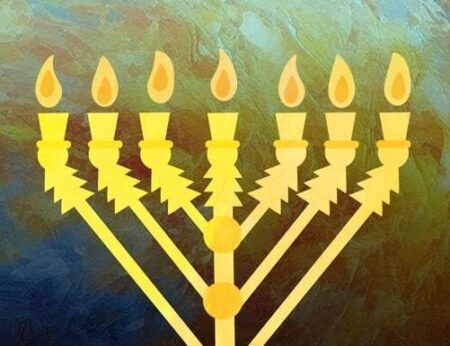Rabbi Akiva's Night in the Field

Orach Chaim 230:5 and the Meaning of Real Emunah
We often talk about the importance of having faith [emunah] but do we really understand what it means? Pause for a few moments and ask yourself. Don't just think about an answer, put your understanding into actual words. Speak it aloud, and try to use simple and direct words so that if a child were listening, he would be able to understand your explanation. After you've done that, continue reading. And the end of the lesson, you will be able to assess the accuracy of your initial understanding.
It is written in the Prophets (Habakkuk 2:4): וְצַדִּיק בֶּאֱמוּנָתוֹ יִחְיֶה (The righteous one shall live by his emunah). Therefore, if we want to be a tzaddik, a righteous individual, then we need to know about true emunah, and more importantly, we need to live by it. And we can't live by it if we're not intimately aware of its profound meaning and implications.
An instructive story is told of R' Akiva (Berachot 60b-61a). He and his students were traveling along the road and came to a certain city and inquired about accommodations for the night. For whatever reason, they were turned away. As a result, they had to spend the night in the field. After they got their campsite set up, a strong wind blew through the area and extinguished their campfire leaving them in the dark and without any fuel for cooking or heat for staying warm. Next, a cat came along and killed R' Akiva's rooster. Finally, a lion appeared out of nowhere and killed his donkey. At each turn of events, he didn't complain or get upset, rather he just spoke aloud a simple but profound statement: כׇּל דְּעָבֵיד רַחֲמָנָא לְטָב (All that the Merciful One does is for good). He didn't equivocate or hesitate. It wasn't something that he needed to think about. He just stated the truth of this world as he understood it.
Later that night, a marauding army of Roman soldiers attacked the city and took everyone and everything in it as spoils of war. Of course, because R' Akiva was out in the middle of the field, without a campfire and without a noisy rooster or donkey to give away their location, he and his students were spared the fate suffered by the inhabitants of the city. Now that his students could clearly see the benefit in what had taken place, he said to them: לָאו אֲמַרִי לְכוּ כׇּל מַה שֶּׁעוֹשֶׂה הַקָּדוֹשׁ בָּרוּךְ הוּא הַכֹּל לְטוֹבָה (Didn't I say to you, All that the Holy One, blessed be He, does, all is for the best?)
Was R' Akiva saying, 'I told you so'? Hardly. He was teaching his students something extraordinarily important and yet very subtle at the same time. Let's see if we can understand his lesson.
First of all, we should know that R' Akiva's statement isn't just brought down in the Gemara as a nice story to inspire us and give us some mussar [instructive correction], rather it is also brought down in the Shulchan Aruch itself as halachah (Orach Chaim 230:5): לעולם יהא אדם רגיל לומר כל מה דעביד רחמנא לטב עביד (Always, a person should accustom himself to say, 'All that the Merciful One does, He does for good').
Why is it so important to speak it aloud? Why can't we just think a thought of emunah? It is explained in Likutei Moharan 173 that the root of emunah and root of the lowest aspect of the soul, i.e. the nefesh, are one and the same: כִּי יֵשׁ בְּחִינַת שֹׁרֶשׁ הָאֱמוּנָה...שֶׁהִיא בְּחִינַת פְּנִימִיּוּת הָאֱמוּנָה...וְהִיא בְּחִינַת פְּנִימִיּוּת הַנֶּפֶשׁ כִּי הַנֶּפֶשׁ וְהָאֱמוּנָה הֵם בְּחִינָה אַחַת (For there is such a thing as the root of emunah...which is the inner aspect of emunah...and this is the inner aspect of the soul, for the soul and emunah are one aspect). We also learn there how speech [dibbur] is connected to the nefesh: וְהַדִּבּוּר הוּא הַנֶּפֶשׁ בְּעַצְמוֹ כְּמוֹ שֶׁכָּתוּב: נַפְשִׁי יָצְאָה בְדַבְּרוֹ (And dibbur is the nefesh itself, as it is written [Shir ha-Shirim 5:6]: My soul [nefesh] went out in its speaking). We see that three important 'spiritual' realities are intertwined: nefesh, emunah and dibbur. They all share the same Supernal root. Therefore, true emunah is manifest only through the nefesh when it speaks through the mouth. This is explicitly stated in L.M. II:44: הָאֱמוּנָה תּוֹלָה בְּפֶה שֶׁל אָדָם בִּבְחִינַת "אוֹדִיעַ אֱמוּנָתְךָ בְּפִי" הַיְנוּ עַל־יְדֵי שֶׁמְּדַבְּרִין הָאֱמוּנָה בַּפֶּה זֶהוּ בְּעַצְמוֹ אֱמוּנָה וְגַם עַל־יְדֵי־זֶה בָּאִים לֶאֱמוּנָה (Emunah depends on a person's mouth, in the aspect of [Tehillim 89:2]: 'I shall make known Your emunah with my mouth,' i.e. by speaking about emunah with the mouth, this itself is emunah, and also by way of this comes [even more] emunah). Therefore, if we do not speak out words of emunah, G d forbid, we won't have emunah. And then, what will be the result? The answer was given to Yirmeyahu ha-Navi (7:28): וְאָמַרְתָּ אֲלֵיהֶם זֶה הַגּוֹי אֲשֶׁר לוֹא־שָׁמְעוּ בְּקוֹל יְיָ אֱלֹקָיו וְלֹא לָקְחוּ מוּסָר אָבְדָה הָאֱמוּנָה וְנִכְרְתָה מִפִּיהֶם (And you shall say to them, This is a nation that does not listen to the voice of Hashem their G d, nor does it receive mussar—emunah has been destroyed and is cut off from their mouths).
Therefore, it would seem that we should work on developing the willingness to speak with alacrity words of emunah. But let's be honest. It's probably not natural for most of us. Nevertheless, if we work on it, we will surely succeed. Similarly, we should work on developing the awareness that R' Akiva had cultivated, i.e. that even in the midst of perceived bad, it must for the good. This is what we read in L.M. 4:1: כְּשֶׁאָדָם יוֹדֵעַ שֶׁכָּל מְאֹרְעוֹתָיו הֵם לְטוֹבָתוֹ זֹאת הַבְּחִינָה הִיא מֵעֵין עוֹלָם הַבָּא (When a person knows that all of the events that happen to him are for his good, this is an aspect of the World to Come). And on the flip side, what takes place when we lack emunah in the face of perceived or apparent bad? R' Nachman teaches in L.M. 7:1: דַּע כִּי עִקַּר הַגָּלוּת אֵינוֹ אֶלָּא בִּשְׁבִיל חֶסְרוֹן אֱמוּנָה (You need to know that the essence of exile [galut] is only due to a deficiency of emunah). So there are really only two conditions of existence—the World to Come and galut—and it is up to us to determine in which condition we will live. And the only way out of galut is through emunah (which leads to simchah) which we have learned comes through speaking.
What distinguishes a man such as R' Akiva from the rest of us? How come he didn't feel upset as a result of the events that unfolded around him? How come he was so calm and immediately realized and spoke aloud the truth that what appeared to be bad was really good? It was because he internalized the words of David ha-Melech in Tehillim 145:9: טוֹב־יְיָ לַכֹּל (Hashem is good to all). And this internalization and immediate realization of truth in the present moment is an aspect of da'at [true knowledge], as taught in L.M. 250: דַּע שֶׁכָּל מִינֵי צַעַר וְכָל הַיִּסּוּרִים אֵינָם רַק מֵחֶסְרוֹן הַדַּעַת כִּי מִי שֶׁיֵּשׁ לוֹ דַּעַת וְיוֹדֵעַ שֶׁהַכֹּל בְּהַשְׁגָּחָה מֵהַשֵּׁם יִתְבָּרַךְ אֵין לוֹ שׁוּם יִסּוּרִין וְאֵינוֹ מַרְגִּישׁ שׁוּם צַעַר (You need to know that all types of affliction and all sufferings are only the result of a lack of da'at, for someone who has da'at and knows that everything is through the providence of Hashem, may He be blessed, has no sufferings and he doesn't feel any affliction). Admittedly, this is a very tall order, but that doesn't exempt us from striving toward it. It ought to be our lifelong goal. After all, we want to come out of galut, right?
This same idea is expanded upon by the Baal ha-Tanya in Iggeret ha-Kodesh 11: וּכְשֶׁיִּתְבּוֹנֵן הָאָדָם בְּעוֹמֶק הֲבָנָתוֹ וִיצַיֵּיר בְּדַעְתּוֹ הֲוָויָיתוֹ מֵ״אַיִן״ בְּכָל רֶגַע וָרֶגַע מַמָּשׁ הַאֵיךְ יַעֲלֶה עַל דַּעְתּוֹ כִּי רַע לוֹ אוֹ שׁוּם יִסּוּרִים מִבָּנֵי חַיֵּי וּמְזוֹנֵי אוֹ שְׁאָרֵי יִסּוּרִין בָּעוֹלָם (And when man contemplates in the depth of his understanding and imagines in his mind that his coming into existence is from nothing each and every moment, literally, how can it arise in his mind that he is experiencing bad or any suffering related to children, life or sustenance, or from any other suffering in the world?) The answer is that because the goodness is not comprehended, it is perceived as bad or suffering or affliction, as the Baal ha-Tanya further explains: בֶּאֱמֶת אֵין רַע יוֹרֵד מִלְמַעְלָה וְהַכֹּל טוֹב רַק שֶׁאֵינוֹ מוּשָּׂג לְגוֹדְלוֹ וְרַב טוּבוֹ (In truth, no bad descends from above, everything is good, rather, it is only that there is no perception of His greatness [i.e. His love] and the abundance of His goodness). And this last point touches upon the essence of emunah, i.e. to truly believe that there is no place void of the Holy One, blessed be He, as it is written (Yeshayah 6:3): מְלֹא כׇל־הָאָרֶץ כְּבוֹדוֹ (The entire earth is full of His glory). And if there is no place void of Hashem, then there is no place void of His goodness, even in the midst of apparent disaster.
If so, how can the good become manifest so that it appears and is revealed openly as good and not as bad? The Baal ha-Tanya concludes Iggeret ha-Kodesh 11 with these awesome words: וּבֶאֱמוּנָה זוֹ בֶּאֱמֶת נַעֲשֶׂה הַכֹּל טוֹב גַּם בְּגָלוּי שֶׁבֶּאֱמוּנָה זוֹ שֶׁמַּאֲמִין שֶׁהָרַע הַנִּדְמֶה בְּגָלוּי כָּל חַיּוּתוֹ הוּא מִטּוֹב הָעֶלְיוֹן שֶׁהִיא חָכְמָתוֹ יִתְבָּרֵךְ שֶׁאֵינָהּ מוּשֶּׂגֶת וְהִיא הָעֵדֶן שֶׁלְּמַעְלָה מֵעוֹלָם־הַבָּא הֲרֵי בֶּאֱמוּנָה זוֹ נִכְלָל וּמִתְעַלֶּה בֶּאֱמֶת הָרַע הַמְדוּמֶּה בַּטּוֹב הָעֶלְיוֹן הַגָּנוּז (And with this emunah, truly, everything becomes good even in a revealed way, because with this emunah, that one believes that the thing which appears bad, all of its life-force is really from the Supernal Good, which is His wisdom, may He be blessed, which is not perceived, but it is really Eden from Above, from the World to Come, through this emunah, the perceived bad is enveloped and raised, truly, with the hidden Supernal Good). Those are a lot of words, and somewhat difficult to render properly into English, but the gist of it should be clear. The hidden good inside the perceived bad becomes revealed and manifested as truly good through the emunah of the one who is encountering and dealing with the perceived bad. And to each one of us who is striving to live a life that can truly be called life, in this world, i.e. through emunah, this last idea should be exceedingly comforting as well as substantially empowering. For this is the purpose and the essence of our lives down here, i.e. to live with and be aware of Hashem every moment of our existence, even when we don't feel or grasp His goodness nor His presence. In time, if we work at it, we will come to feel His goodness even in times of darkness.
Therefore, we have learned that emunah is the key which can turn everything around, from experiencing good disguised as bad to experiencing the good as good. And that emunah is in our hands to develop it and to express it, i.e. to live by it.
We should now be able to understand the story of R' Akiva much better. Five significant events happened to him that appeared bad, yet he believed and knew that they must be for good. The inn turned him away. He had to spend the night in the open field. The wind blew out his campfire. A cat killed his rooster. And a lion killed his donkey. All that was lacking was an action on his part to flip the hidden good that was disguised as bad into revealed, apparent good. And what was that action? He spoke aloud his unwavering belief in the goodness of G d. He spoke words of emunah. He said, over and over again, 'Whatever Hashem does, He does for good.' And it was through that emunah, through those spoken words, that the true good was revealed and made manifest. And what was the manifest good? Hashem was orchestrating events around him to save his life!
But why did R' Akiva speak aloud his emunah in Aramaic, i.e. כׇּל דְּעָבֵיד רַחֲמָנָא לְטָב (All that the Merciful One does is for good), yet speak in Hebrew after the good was revealed, i.e. כׇּל מַה שֶּׁעוֹשֶׂה הַקָּדוֹשׁ בָּרוּךְ הוּא הַכֹּל לְטוֹבָה (All that the Holy One, blessed be He, does, all is for the best)?
With the help of G d, we'll address that question and a lot more in the next issue of The Shoemaker Report.






